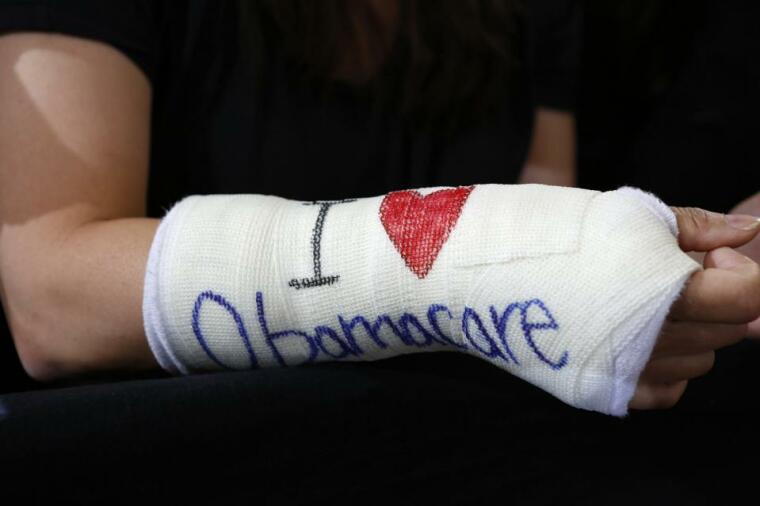Nearly 17 Million Americans Newly Insured Under Obamacare Since 2013, Study Shows

Insurance coverage under the Affordable Care Act, commonly known as Obamacare, has increased with 16.9 million people newly enrolled from 2013 to February this year.
The finding was made in a study conducted by RAND Corporation. It showed that from September 2013 to February 2015, 22.8 million Americans became newly insured while 5.9 million lost coverage, for a net of 16.9 million newly insured Americans.
Of the 16.9 million newly insured, 9.6 million people enrolled in employer-sponsored health plans, 6.5 million in Medicaid, 4.1 million in the individual marketplaces, 1.2 million in non-marketplace individual plans and 1.5 million in other insurance sources.
The study also estimated that 125.2 million Americans — about 80 percent of the non-elderly population that had insurance in September 2013 — experienced no change in the source of insurance during the period.
"The Affordable Care Act has greatly expanded health insurance coverage, but it has caused little change in the way most previously-covered Americans are getting health insurance coverage," said Katherine Carman, the study's lead author. "The law has expanded coverage to more Americans using all parts of the health insurance system."
The study showed that insurance coverage has been increasing since the major provisions of the Affordable Care Act took effect.
It said 11.2 million Americans are insured through new state and federal marketplaces created under the Affordable Care Act, including 4.1 million who are newly covered and 7.1 million people who transitioned to marketplace plans from another source of coverage.
The RAND study was the first to examine insurance transitions since the end of the second open enrollment period under the Affordable Care Act.
Researchers said the findings that the biggest gain in coverage was from employer-sponsored insurance ran counter to predictions that many employers would quit offering insurance in response to the Affordable Care Act.
The study suggested that even if this possibility occured, employer-sponsored coverage would remain the nation's major source of health insurance coverage.
 Christians don't have to affirm transgenderism, but they can’t express that view at work: tribunal
Christians don't have to affirm transgenderism, but they can’t express that view at work: tribunal Archaeology discovery: Medieval Christian prayer beads found on Holy Island
Archaeology discovery: Medieval Christian prayer beads found on Holy Island Presbyterian Church in America votes to leave National Association of Evangelicals
Presbyterian Church in America votes to leave National Association of Evangelicals Over 50 killed in 'vile and satanic' attack at Nigerian church on Pentecost Sunday
Over 50 killed in 'vile and satanic' attack at Nigerian church on Pentecost Sunday Ukrainian Orthodox Church severs ties with Moscow over Patriarch Kirill's support for Putin's war
Ukrainian Orthodox Church severs ties with Moscow over Patriarch Kirill's support for Putin's war Islamic State kills 20 Nigerian Christians as revenge for US airstrike
Islamic State kills 20 Nigerian Christians as revenge for US airstrike Man who served 33 years in prison for murder leads inmates to Christ
Man who served 33 years in prison for murder leads inmates to Christ


 Nigerian student beaten to death, body burned over ‘blasphemous’ WhatsApp message
Nigerian student beaten to death, body burned over ‘blasphemous’ WhatsApp message 'A new low': World reacts after Hong Kong arrests 90-year-old Cardinal Joseph Zen
'A new low': World reacts after Hong Kong arrests 90-year-old Cardinal Joseph Zen Iran sentences Christian man to 10 years in prison for hosting house church worship gathering
Iran sentences Christian man to 10 years in prison for hosting house church worship gathering French Guyana: Pastor shot dead, church set on fire after meeting delegation of Evangelicals
French Guyana: Pastor shot dead, church set on fire after meeting delegation of Evangelicals ‘Talking Jesus’ report finds only 6% of UK adults identify as practicing Christians
‘Talking Jesus’ report finds only 6% of UK adults identify as practicing Christians Mission Eurasia ministry center blown up in Ukraine, hundreds of Bibles destroyed: 'God will provide'
Mission Eurasia ministry center blown up in Ukraine, hundreds of Bibles destroyed: 'God will provide' Church holds service for first time after ISIS desecrated it 8 years ago
Church holds service for first time after ISIS desecrated it 8 years ago Burger King apologizes for 'offensive campaign' using Jesus' words at the Last Supper
Burger King apologizes for 'offensive campaign' using Jesus' words at the Last Supper Uganda: Muslims abduct teacher, burn him inside mosque for praying in Christ’s name
Uganda: Muslims abduct teacher, burn him inside mosque for praying in Christ’s name